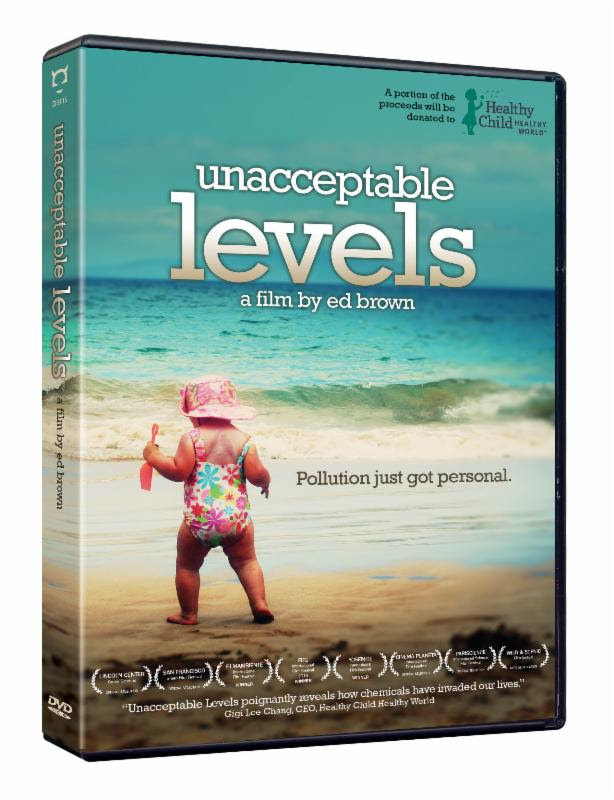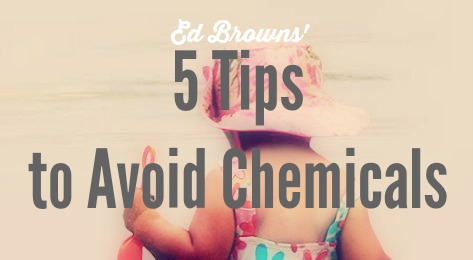Unacceptable Levels, an acclaimed documentary from first time filmmaker Ed Brown, released on DVD June 10th. Originally inspired after becoming a father, Ed was determined to uncover the truth about the chemicals we come into contact with every day and how they impact his family. Did the chemicals have anything to do with the cataract in his right eye at such a young age? His asthma or his wife’s Crohn’s disease? A self-taught filmmaker with a mission to ensure the well-being of his family, Brown ultimately hopes to catalyze change for a safer world.
About Unacceptable Levels
Over 80,000 chemicals flow through our system of commerce, and many go straight into our bodies. Due to this unrelenting exposure, we have approximately 200 synthetic industrial chemicals interacting with our cells every single day. And, until recently, modern science didn’t quite understand what that meant for us in the long run, but now, that’s changing…
Running Time 76 min.
A portion of the proceeds from sales of this film will be donated to HealthyChild.org
Here are Ed Brown’s 5 Tips to Avoid Chemicals
1. Read food labels. Artificial sweeteners, preservatives, nitrates, artificial colors, MSG… if it’s processed, it is likely to contain one or more of these ingredients. Sodium benzoate and potassium benzoate are preservatives that are sometimes added to sodas to prevent mold growth, but benzene is a known carcinogen. Butylated hydroxynaisole (BHA) is another preservative that is potentially cancer causing. If you can’t pronounce it, chances are you shouldn’t be eating it.
2. Purchase organic food whenever possible. Factor in the potential health costs of processed and conventionally grown (read: pesticide rich) foods and organic food doesn’t break the bank. In fact, eating organic food is possible even on a shoestring budget-we can eat out less, reduce meat and processed food consumption, buy in bulk and eat leftovers (Americans, on average, throw away about 23 pounds of perfectly edible food, per person, every month!). Personally, I’d rather put chemical free-foods on the table for peace of mind and fewer visits to the doctor’s office. As we vote for organic with our dollars, the fewer toxic chemicals will be found not only in our food, but in our air and drinking water. Using our purchasing power will also help organic make organic more widely accessible. Already, organic food in the fastest growing sector in agriculture.
3. Switch to non-toxic, biodegradable laundry and cleaning products. This is an easy way to create a safer, healthier home environment for you, your family and your pets. There are so many choices out there today, and they’re becoming more and more readily available at big box stores.
4. Transition to non-toxic personal care products. Public health allows almost any chemical as an ingredient in personal care products. Misleading and incomplete labeling of ingredients, as well as unsubstantiated claims, are also allowed. And our skin is our body’s largest organ!
Say no to triclocarbon, triclosan, parabens, retinol, PEGS, ceteareths, polyethelene… the list is long. If and ingredient isn’t familiar (or can’t be easily pronounced), it’s a good idea to look it up or simply avoid it.
5. Reuse, reduce, recycle. We’ve all heard this before, but it’s important not just for the Earth, but for our health. Our planet is inundated with plastic products and waste, which end up leaching into our soil and drinking water and even find their way into our oceans and lakes. In one way or another, as the top of the food chain, we’re going to end up ingesting it. Look for the products with less packaging, think twice about upgrading to a new phone; bring reusable bags to the grocery store. It can be that simple.
Purchase Unacceptable Levels
Unacceptable Levels DVD is available for purchase on Amazon.com:
Connect with Unacceptable Levels
Facebook // Twitter // Pinterest

Win Unacceptable Levels
Three (3) lucky Long Wait For Isabella readers will win a copy of Unacceptable Levels on DVD. Enter the Rafflecopter form below for your chance to win. This giveaway is open to US and CAN residents 18+.
Disclosure: I was sent a copy of this film for review.




I’m pretty good about all of the tips. I read all labels and only use good products on my body and in my home.
I try to do all the tips you mentioned. I’m troubled about the chemicals used for fracking. The oil & gas companies won’t divulge what the chemicals are. We don’t need to second guess what we put into the ground and the ground water.